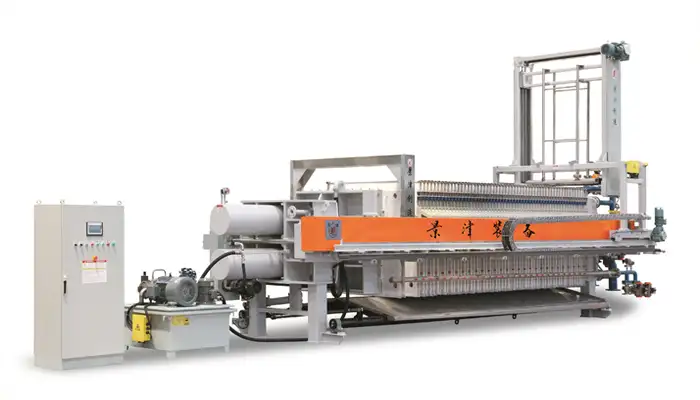Wastewater Filtering Solutions: How Modern Industries Reduce Costs and Improve Efficiency
Nov 17, 2025
Why Wastewater Filtering Has Become a Priority for Modern Industrial Plants
Across manufacturing, mining, chemical processing, food production, and municipal treatment facilities, wastewater filtering is no longer viewed as a simple compliance requirement—it is a strategic investment that impacts operating costs, energy usage, environmental footprint, and long-term sustainability.
As environmental regulations tighten worldwide and wastewater discharge fees continue to rise, industrial plants are under pressure to upgrade outdated filtration equipment. Efficient wastewater filtering ensures:
- Lower sludge disposal costs
- Higher water recovery for reuse
- Reduced environmental risks and penalties
- Stable and predictable effluent quality
- Improved plant reliability and uptime
More companies are implementing advanced wastewater sludge dewatering technologies to reduce the volume of sludge before disposal, significantly lowering overall treatment costs. For reference, you can explore practical applications here: wastewater sludge dewatering.
Key Challenges in Industrial Wastewater Filtering
Wastewater varies significantly across industries. High solids content, corrosive chemicals, temperature fluctuations, and variable flow volumes create difficulties for many traditional filtration systems. Common challenges include:
1. High Moisture Content in Sludge
Excess water in sludge leads to:
- Higher disposal fees (charged by weight or volume)
- Greater energy consumption for drying
- More complex handling and storage
2. Inconsistent Filtration Performance
If the filtration system cannot adapt to fluctuations in solids concentration or flow rate, plants experience problems such as:
- Slow processing time
- Unstable filtrate quality
- Backflow or clogging
3. Rising Regulatory Standards
Governments now require more stringent limits on pollutants such as:
- COD/BOD
- Suspended solids
- Heavy metals
- Oils and grease
- Pathogens
4. Increased Operational Costs
Inefficient filtering means more labor, more maintenance, and higher energy consumption—directly affecting total cost of ownership (TCO).
To overcome these challenges, industrial buyers increasingly rely on high-efficiency, automated filtration systems designed to maintain stable output in demanding environments.
Advanced Wastewater Filtering Technologies Used in Industry
Industrial wastewater treatment facilities today employ a combination of mechanical, physical, and chemical filtration methods. The most commonly applied include:
1. Mechanical Screening and Pre-Filtration
These initial stages remove large solids such as plastics, fibers, and debris to protect downstream equipment.
2. Sedimentation and Flocculation
Chemical processes that aggregate fine particles into larger masses, making them easier to filter.
3. Membrane Filtration (UF/RO Systems)
Used especially in high-purity water reuse applications, but often sensitive to fouling.
4. Press Filtration Systems
Widely used for sludge dewatering because of their ability to:
- Achieve high solid dryness
- Operate under high pressure
- Handle various sludge characteristics
- Produce consistent filtrate quality
Many industrial plants choose an industrial filter press as their primary dewatering system for its proven reliability and efficiency across industries such as mining, electroplating, municipal wastewater, textiles, and petrochemicals.
How Efficient Wastewater Filtering Reduces Operational Costs
For B2B buyers, the financial impact of improved wastewater filtering is one of the strongest motivations for upgrading systems. Effective filtration can reduce:
1. Sludge Disposal Costs
Improved dewatering reduces moisture by up to 30–50%, significantly lowering tonnage-based disposal fees.
2. Fresh Water Consumption
Recovered water can be reused in:
- Cooling towers
- Washing and cleaning processes
- Industrial recycling systems
This reduces the need for costly fresh water supply and aligns with sustainability goals.
3. Energy Consumption
Better filtering reduces the load on evaporators, dryers, blowers, and aeration tanks—cutting overall plant energy usage.
4. Maintenance & Downtime
A stable filtration system:
- Minimizes blockages
- Reduces manual cleaning
- Extends equipment lifetime
- Ensures predictable cycle times
These cost reductions compound yearly, making wastewater filtering a high-ROI investment.

Selecting the Right Wastewater Filtering Equipment for Your Industry
Different industries require different filtration approaches. Key selection criteria include:
1. Sludge Characteristics
Viscosity, corrosiveness, particle size distribution, and solids percentage determine the most suitable filtration technology.
2. Desired Filtrate Quality
High-purity applications require tighter filtration levels, potentially including membrane stages.
3. Automation Requirements
Modern industrial buyers often prefer systems with:
- Automated plate shifting
- Cloth washing systems
- Remote monitoring and control
- PLC integration
4. Capacity and Scalability
Plants with growing production must consider systems that allow future expansion without replacing major equipment.
5. Total Cost of Ownership
A well-designed system reduces long-term OPEX significantly—even if initial investment is higher.
This is why an increasing number of industrial and municipal projects rely on advanced filter press technologies that offer a balanced combination of efficiency, automation, durability, and cost-effectiveness.
Jingjin — A Global Leader in Wastewater Filtering and Sludge Dewatering Solutions
Jingjin is one of the world’s leading manufacturers of industrial filtration equipment, with decades of engineering experience and installations across more than 140 countries.
We specialize in:
- Chamber filter presses
- Membrane filter presses
- Fully automatic filtration systems
- Sludge dewatering solutions
- Customized filtration lines for industry and municipal treatment
What sets Jingjin apart:
- Strong R&D and innovation capabilities
- Advanced CNC machining and precision manufacturing
- Durable filter plates and optimized cloth materials
- Stable performance in high-solid or chemically complex wastewater
- Long equipment life and low operating costs
- Full technical support and after-sales service
Whether you are upgrading your existing filtering system or building a new wastewater treatment line, Jingjin provides high-efficiency solutions tailored to your operational needs.
